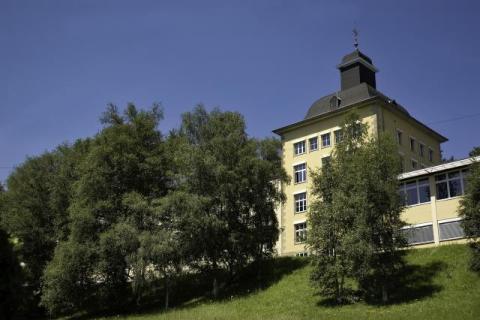University of Siegen - Department of Physics
Institute

Department of Physics, University of Siegen
Walter-Flex Str.3
D-57068 Siegen
Germany
+49 (271) 740-3700

Department of Physics, University of Siegen
Walter-Flex Str.3
D-57068 Siegen
Germany
+49 (271) 740-3700
The main research topics in the Department of Physics at the University of Siegen are experimental particle and astroparticle physics, theoretical particle physics, experimental and theoretical solid state physics and quantum optics.
In experimental particle physics, the main topics are detector development and physics analyses with the data collected by the ATLAS Detector at the LHC accelerator at CERN, Geneva. The main focus in the detector development is on the ATLAS pixel detector and Medical imaging, and the physics analyses focus on the physics of the top quarks and B-mesons. Together with the theoretical physicists, the fundamental particles and forces of our universe are studied.
The physics classes in Siegen are small, resulting in an intensive supervision including a mentoring program. At Siegen, a large variety of courses with a large number of special topics is offered.
Forschungsschwerpunkte des Fachbereichs Physik der Uni Siegen sind experimentelle Teilchen- und Astroteilchenphysik, theoretische Teilchenphysik, experimentelle und theoretische Festkörperphysik sowie Quantenoptik.
In der experimentelle Teilchenphysik wird in der Detektorentwicklung und an der Physikanalyse für den ATLAS Detektor am Beschleuniger LHC am CERN, Genf, gearbeitet. Die Detektorentwicklung umfasst hierbei zum einen den ATLAS Pixel Detektor, als auch die medizinische Bildgebung und die Datenanalyse fokussiert sich auf die Physik der Top-Quarks und B-Mesonen. Gemeinsam mit der Theoretischen Physik untersucht man die fundamentalen Bausteine und Kräfte unseres Universums.
Im Physikstudium in Siegen gibt es eine sehr intensive Betreuung der Studierenden, unterstützt durch ein Mentorenprogramm. Siegen bietet ein breites Spektrum an Lehrveranstaltungen mit einer Vielzahl von Vertiefungsmöglichkeiten. Das System der Bachelor- und Masterstudiengänge wurde bereits vor drei Jahren eingeführt und hat sich als effektiv bewährt.

